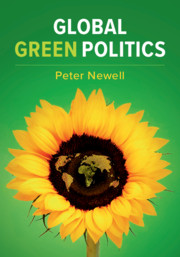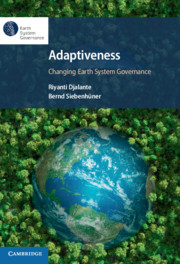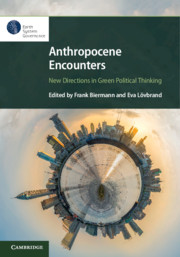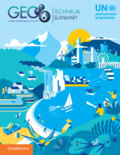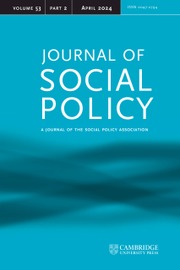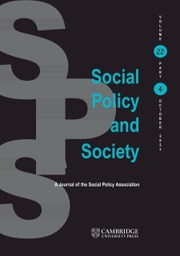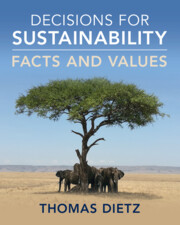
Decisions for Sustainability
Facts and Values
£29.99
- Author: Thomas Dietz, Michigan State University
- Date Published: June 2023
- availability: Available
- format: Paperback
- isbn: 9781009169424
£
29.99
Paperback
Other available formats:
Hardback, eBook
Looking for an inspection copy?
This title is not currently available on inspection
-
Decisions by individuals, organisations, and nations shape the well-being of humans and other species, the environment, and sustainability. Decisions for Sustainability examines how we can make better decisions concerning our future. It incorporates sociological, psychological, and economic perspectives to highlight our strengths and weaknesses in decision-making, and suggest strategies to influence both individual and societal decisions. Sustainability challenges – from local land use and toxic contamination to climate change and biodiversity loss – illustrate how we can improve decision making and what factors lead to conflict. How we use science in the face of uncertainty is also examined, and a range of ethical criteria for good decisions are proposed. Emphasizing the need for diversity in decision making and clarifying the relationship between reform and societal transformation, this book provides a comprehensive view of what we know about decision-making, and how we can do better in the face of sustainability challenges.
Read more- Draws on multiple disciplines including sociology, social and cognitive psychology, and economics to give robust and effective guidance on better decision making in sustainability
- Analyzes the strengths and limits of science in establishing facts, especially the relationship between values and science, to improve processes for making decisions in the face of uncertainty and conflict
- Describes the criteria for making good decisions on sustainability, allowing for more effective policies and better programs
- Assesses the ways of influencing both individual and collective decision-making on sustainability
Reviews & endorsements
'Written by one of the most influential voices in environmental social science and policy over the last five decades, Decisions for Sustainability provides a state-of-the-art examination of the hard choices confronting sustainability experts. Destined to become a classic in the field.' Michael Vandenbergh, School of Law, Vanderbilt University
See more reviews'From renting cars, having children, and flying on a vacation to eating meat and buying a home, almost every action we take in modern society contributes to climate change. The distinguished professor Thomas Dietz tackles this pesky aspect of the climate crisis head on in his masterful book on how the choices we make amplify carbon emissions. Interspersed with a startling array of marshaled facts, case studies, examples and even lyrics, Decisions for Sustainability is indispensable reading for anyone seeking to better comprehend the social and behavioral reasons we perpetuate climate catastrophe, but also have the personal and interpersonal skills inside ourselves to escape it.' Benjamin K. Sovacool, Boston University and Sussex University
'The wisdom of a long and distinguished career crystallized into a gem of a book. Tom weaves together theory and insights from numerous disciplines to help us understand and support decision making for a sustainable future. Excellent supplementary reading for my graduate and undergraduate classes on climate action and policy.' Elke U. Weber, Princeton University
'Tom Dietz played a major role in creating a field that we all needed, a science of humans and the environment that recognized the complexity of their interdependence. With Decisions for Sustainability, he has created an introduction that we all need: lucid, accessible, and respectful of the science and those it hopes to serve.' Baruch Fischhoff, Carnegie Mellon University
'Renowned (and indefatigable!) environmental studies scholar Thomas Dietz has produced yet another field-defining work. Written in lively and accessible language, Decisions for Sustainability demonstrates how important deliberation and democracy are for ensuring a sustainable and equitable future. Dietz's exploration of his own family's experiences with technological and environmental transformations is refreshing and effective for illuminating the sociological imagination – that foundational interplay between the public and the personal. Dietz also pays close attention to the key role of multiple forms of diversity, emphasizing how context, history and power significantly shape our thinking and actions around sustainability. We must improve our decision making practices in order to create a more livable, just, and verdant world, and Decisions for Sustainability is a clear-eyed and insightful guide for supporting that goal.' David N. Pellow, University of California Santa Barbara and author of What is Critical Environmental Justice?
'Tom Dietz has been able to condense the multiple complexities of how individuals, organisations, and societies do make and should make decisions in the context of globalised economies, sustainability challenges, and growing inequities. The analysis provides insights from ecology, psychology, sociology, and ethics that improve our knowledge about what matters to society and nature but that also provides guidance for developing a more deliberative and inclusive decision culture. A must-read-book for all decision makers!' Ortwin Renn, Research Institute for Sustainability, Helmholtz Center, Potsdam
'This book is a must read for scientists and practitioners interested in environmental decision making. The book provides key insights into how individuals, organizations and nations can make better decisions to address sustainability challenges and improve the wellbeing of humans and other species, and the quality of nature and the environment.' Linda Steg, University of Groningen
'This book could be used as a textbook for sustainability, public administration, or public participation courses or as general reference book.' Richard Smardon, Journal of Environmental Studies and Sciences
'A wide-ranging, interdisciplinary exploration of decision-making and sustainability … Highly recommended.' A. S. Ricker, Choice
Customer reviews
17th Oct 2024 by UName-1376674
Thomas Dietz’s latest work is an exemplar of interdisciplinary research and a must read for anyone interested in decision-making processes in relation to sustainability. Dr. Dietz motivates his broad-ranging and insightful discussion of this critical topic with a brief personal and family history of growing up in Kent, Ohio along the polluted Cuyahoga River. These experiences--including conducting environmental research on the river as an undergraduate at Kent State and the interruption of that research by the Kent State massacre in 1970--sparked his sociological imagination--driving home the point that questions of sustainability not only involve an inherent tension between science and politics but are also necessarily “’place-based,’ but ‘place’ makes sense only by linking the local to the global.” In chapter 1, he elaborates this local-global dynamic, discusses how the decisions we make in various roles impact the environment and--consistent with the evolutionary perspective that informs the book--emphasizes the importance of the interplay between variation and context for sustainability decisions. Chapter 2 explores how the concept of sustainability itself emerged in the late twentieth century against the backdrop of economic and population growth, the rise of the environmental movement, and the post-cold war expansion of democracy. In Chapter 3, Dietz introduces three major models of decision-making--The Rational Actor Model, the social-psychological literature which emphasize the causal links between values, beliefs and norms, and models that highlight heuristics and biases. Subsequent chapters address the difficulties of separating facts and values in fields, like sustainability science, where the ostensibility and repeatability of findings are low a discussion of seven criteria for making good decisions which builds upon the utilitarian, anarchist/libertarian and deliberative traditions potential sources of conflict in sustainability decisions tensions between reformist versus transformational approaches to sustainability and how we can improve individual and collective decision making with an emphasis in the latter on the potential benefits of deliberative processes. Throughout this discussion, Dietz continually emphasizes the importance of rejecting anthropocentrism (Who speaks for Wolf?) and decolonizing science by incorporating the concerns and insights of groups previously marginalized based on class, gender, and race, including various indigenous peoples, and the differently abled into sustainability decisions. In short, Thomas Dietz’s “Decisions for Sustainability” is an impressive achievement. He successfully integrates insights from ecology, psychology, sociology, economics, political science, and ethics. Despite the complexity of the topics and literatures addressed, his theoretical discussion is entirely accessible and illustrated with numerous empirical examples. This book provides an excellent introduction to the field for advanced undergraduate and graduate classes. Professionals in the field will also benefit not only from the overall integration that Dietz provides but also from the additional insights and suggested lines of inquiry contained in over ninety pages of footnotes as well as the extensive bibliography which is itself an invaluable resource. Perhaps what is most refreshing about this work is Thomas Dietz’s openness to the possibility that some of his conclusions could be wrong. This all too rare stance reflects not only the characteristic humility of the author himself but, more importantly, his life-long commitment to creating more sustainable societies through deliberative processes. Indeed, the book is an extended invitation to join that process. As he unassumingly states, “My hope is simply to encourage further conversation.”
Review was not posted due to profanity
×Product details
- Date Published: June 2023
- format: Paperback
- isbn: 9781009169424
- length: 382 pages
- dimensions: 254 x 203 x 21 mm
- weight: 0.826kg
- availability: Available
Table of Contents
1. Sustainability and Decisions
2. Sustainability Evolving
3. How We Make Decisions
4. Facts and Values
5. What is a Good Decision
6. Decisions and Conflict
7. Reform or Transformation
8. Influencing Decisions
9. Influencing the Conversation
Endnotes
References
Index.
Sorry, this resource is locked
Please register or sign in to request access. If you are having problems accessing these resources please email [email protected]
Register Sign in» Proceed
You are now leaving the Cambridge University Press website. Your eBook purchase and download will be completed by our partner www.ebooks.com. Please see the permission section of the www.ebooks.com catalogue page for details of the print & copy limits on our eBooks.
Continue ×Are you sure you want to delete your account?
This cannot be undone.
Thank you for your feedback which will help us improve our service.
If you requested a response, we will make sure to get back to you shortly.
×
